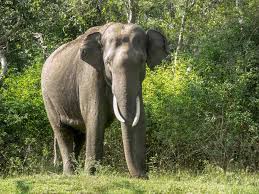Ahmedabad
(Head Office)Address : 506, 3rd EYE THREE (III), Opp. Induben Khakhrawala, Girish Cold Drink Cross Road, CG Road, Navrangpura, Ahmedabad, 380009.
Mobile : 8469231587 / 9586028957
Telephone : 079-40098991
E-mail: dics.upsc@gmail.com

Elephant Conservation in India
News: Union Minister Shri Bhupender Yadav, addressing World Elephant Day, highlighted India’s vital role in conserving wild Asian elephants due to its largest population.
Background:
• August 12 is celebrated as World Elephant Day every year. The theme for World Elephant Day 2023 is “Ending the Illegal Wildlife Trade”
• As per Elephant Census (2017), Karnataka has the highest number of elephants (6,049), followed by Assam (5,719) and Kerala (3,054)
• India has about 30,000 Asian Elephants, which is the world’s largest population of the species (More than 60% of the world’s elephant population is in India)
What role do elephants play in ecosystem conservation?
• Elephants are seed dispersers, which means they eat fruits and plants and then pass the seeds through their digestive system. This helps to spread the seeds over long distances and create new habitats for other animals and plants. Elephants can disperse thousands of seeds per day, and some plants depend entirely on elephants for their reproduction.
• Elephants are ecosystem engineers, which means they modify and maintain the physical environment around them in a way that benefits the whole wildlife community. Elephants can dig waterholes during droughts, which provide water for themselves and other animals. They can also create pathways in dense forests, which allow access for smaller animals and humans. They can also knock down trees and break branches, which create open spaces and increase light penetration for grasses and herbs to grow.
• Elephants are tourism magnets, which means they attract money and attention for local communities and conservation efforts. Elephants are one of the most popular animals to see in wildlife safaris, and they generate a lot of revenue for the tourism industry.
• Finding natural salt licks - Elephants use their sense of smell to detect areas in the ground that have large quantities of minerals. These salt lick sites are not only used by elephants, but also other herbivores who may need to increase their mineral intake.
What are steps taken by government for Elephant conservation?
• India declared elephants as the National Heritage Animals, affording them protection under Schedule I of the Indian Wildlife (Protection) Act, 1972.
• Project Elephant – Launched in 1992 as a centrally sponsored scheme it seeks to protect elephants, their habitat, address issue of mananimal conflict etc. Now, Project elephant is merged with Project Tiger (common fund allocation for both)
• MIKE program (2003) - Monitoring the Illegal Killing of Elephants (MIKE) program (2003) to monitor the effectiveness of field conservation efforts.
• Management Effectiveness Evaluation (MEE) applied to elephant reserves to enhance habitats, water sources, and bamboo growth. Designation of 33 Elephant Reserves across 14 states.
• Elephant Corridors - Efforts to mitigate the impact of roads and railways on elephant movement, including collaboration with states to identify critical sites along railways, constructing underpasses, overpasses, and ramps, and establishing speed limits and level crossings.
• Land Use Land Cover Analysis - The MoEF&CC‘s Land Use Land Cover analysis of elephant reserves for states will offer a detailed approach towards elephant conservation.
Protection Status:
• IUCN list – Endangered
• The Asian Elephant has been given the highest level of protection in India by its inclusion in Schedule 1 of the Wildlife (Protection) Act 1972.
• Asian Elephants are also included in Appendix I of CITES.
• In 2019, with the efforts put in by the Indian Government, the Indian elephants have now been included in the Appendix I of the Convention of Migratory Species (CMS).

Address : 506, 3rd EYE THREE (III), Opp. Induben Khakhrawala, Girish Cold Drink Cross Road, CG Road, Navrangpura, Ahmedabad, 380009.
Mobile : 8469231587 / 9586028957
Telephone : 079-40098991
E-mail: dics.upsc@gmail.com
Address: A-306, The Landmark, Urjanagar-1, Opp. Spicy Street, Kudasan – Por Road, Kudasan, Gandhinagar – 382421
Mobile : 9723832444 / 9723932444
E-mail: dics.gnagar@gmail.com
Address: 2nd Floor, 9 Shivali Society, L&T Circle, opp. Ratri Bazar, Karelibaugh, Vadodara, 390018
Mobile : 9725692037 / 9725692054
E-mail: dics.vadodara@gmail.com
Address: 403, Raj Victoria, Opp. Pal Walkway, Near Galaxy Circle, Pal, Surat-394510
Mobile : 8401031583 / 8401031587
E-mail: dics.surat@gmail.com
Address: 303,305 K 158 Complex Above Magson, Sindhubhavan Road Ahmedabad-380059
Mobile : 9974751177 / 8469231587
E-mail: dicssbr@gmail.com
Address: 57/17, 2nd Floor, Old Rajinder Nagar Market, Bada Bazaar Marg, Delhi-60
Mobile : 9104830862 / 9104830865
E-mail: dics.newdelhi@gmail.com